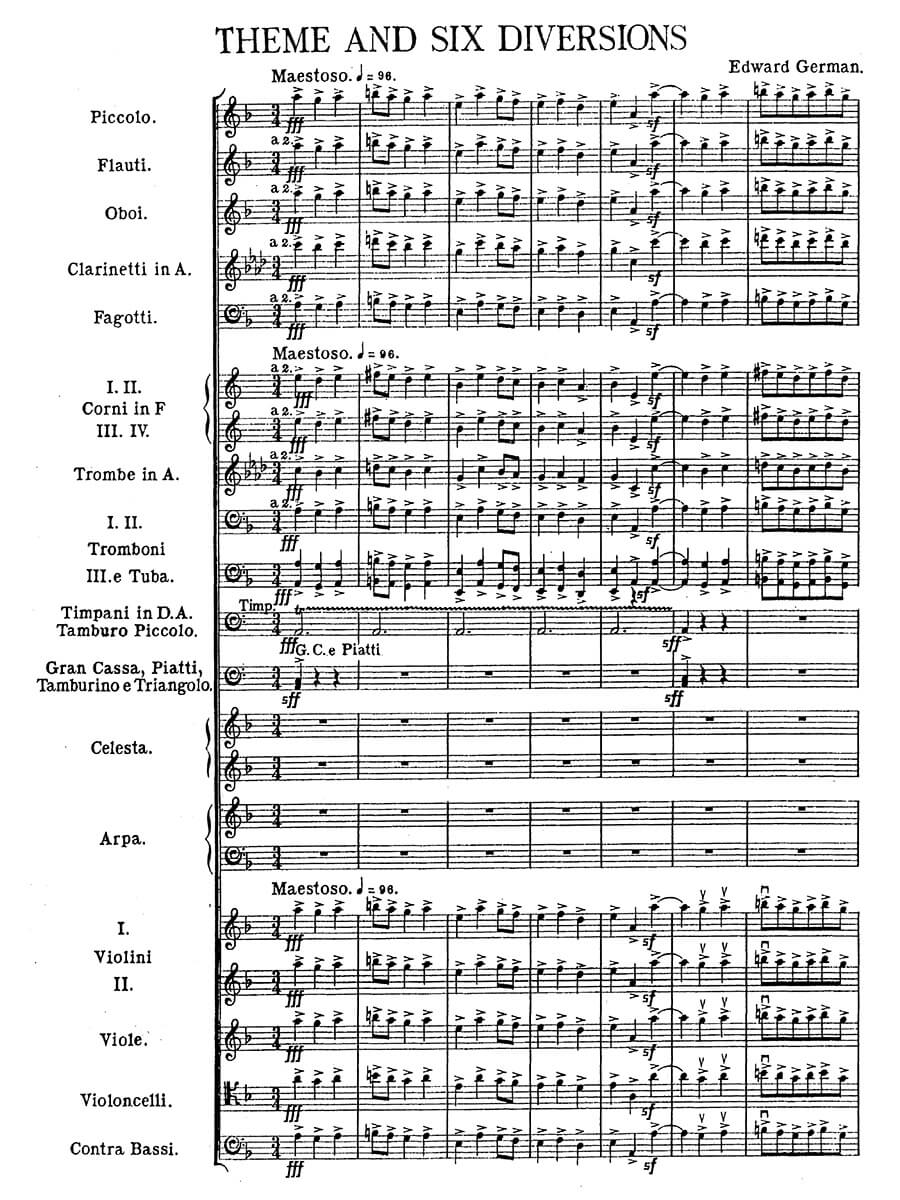Theme and Six Diversions for orchestra
German, Edward
30,00 €
Preface
Edward German – Theme and Six Diversions
(b. Whitchurch, Shropshire, 17 February 1862 – d. London, 11 November 1936)
Preface
German Edward Jones was born in the Shropshire market town of Whitchurch. The unusual name of ‘German’ was based on that of St Garmon, a Welsh saint (it should be said with a hard ‘G’, like the names Geraint or Gerwyn). He showed musical promise and won a scholarship to the Royal Academy of Music, where he studied with Ebeneezer Prout and began a lifelong friendship with a fellow pupil, Henry Wood. By this time (1880) he was calling himself Edward Jones, but discovering another pupil with the same name, he adopted the stage-name of Edward German. That at least was the story he told for the rest of his life.
German obtained an appointment as musical director at the Globe Theatre in 1887, and began a career that would see him become the pre-eminent theatrical composer in Britain, with a knighthood in 1928. His biggest success was Merrie England (1902), but he wrote six operas and a further nine theatre scores, together with orchestral and choral works, songs and piano music.
The Theme and Six Diversions was written during the First World War, and it marked the beginning of the end for German’s composing. He had been ill for some time with rheumatism and had taken long vacations at a spa in Wales because of it. Gradually, over the next few years, he limited composition to special events, such as the centenary of the Royal Academy of Music in 1922. Nevertheless, the Theme and Six Diversions was played for the first time at a Royal Philharmonic Society concert in March 1919, conducted by the composer. In following years it proved a popular concert item, German conducting it more than twenty-five times.
It may have had its genesis in a suggestion that Edward Elgar made in 1905 at the Norwich Festival. Elgar’s idea was that German should base a work on the obscure Anglo-Danish King Cnut (or Canute) – in particular on an incident when Cnut was said to have composed a song while being rowed across the fens near Ely. This was an idea that Elgar returned to in later years, even suggesting that it be written for a Royal Philharmonic Society concert. In the event German’s work is not programmatic in any sense, and most of it has no feel of the medieval about it, but the Theme itself does seem to evoke plainchant heard through the mist. German called it “very original”. The first Diversion is in similar – but louder – vein. The remaining five provide a delicate scherzo, a gypsy dance, a slow movement of divided strings, a waltz that seems to have escaped from an opera of Richard Strauss, and a march over a pizzicato bass. One regularly repeated criticism of the work is that it is too short for its material – what a ballet it might have made!
Phillip Brookes, 2023
Deutsches Vorwort lesen> HERE
Score Data
| Special Edition | The Phillip Brookes Collection |
|---|---|
| Genre | Orchestra |
| Pages | 102 |
| Size | 210 x 297 mm |
| Printing | Reprint |
